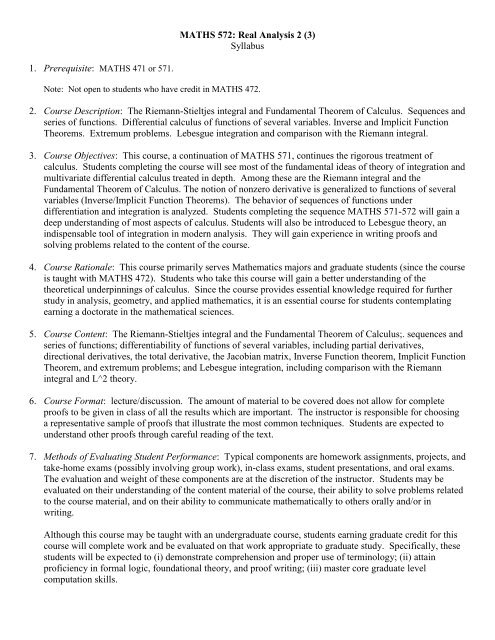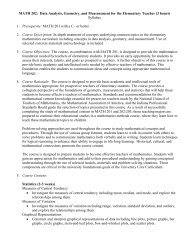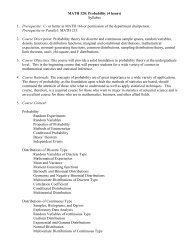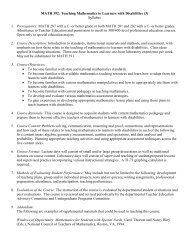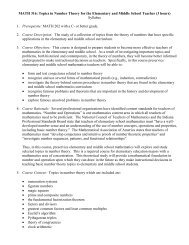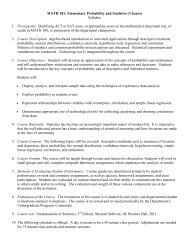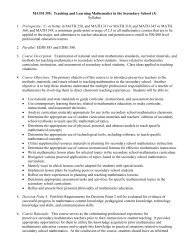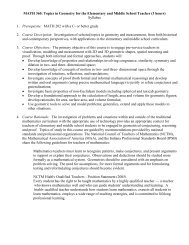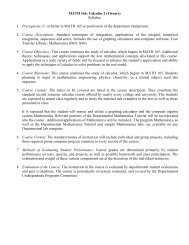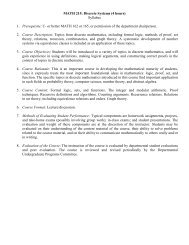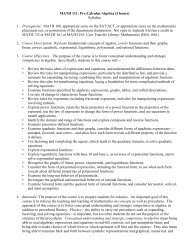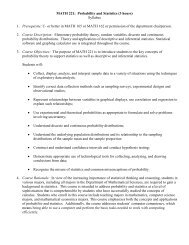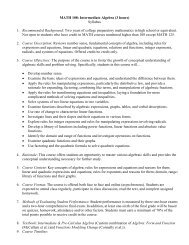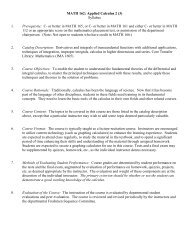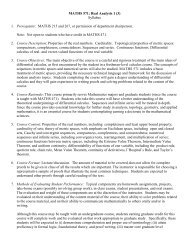MATHS 472: Real Analysis 2 (3)
MATHS 472: Real Analysis 2 (3)
MATHS 472: Real Analysis 2 (3)
Create successful ePaper yourself
Turn your PDF publications into a flip-book with our unique Google optimized e-Paper software.
1. Prerequisite: <strong>MATHS</strong> 471 or 571.<br />
<strong>MATHS</strong> 572: <strong>Real</strong> <strong>Analysis</strong> 2 (3)<br />
Syllabus<br />
Note: Not open to students who have credit in <strong>MATHS</strong> <strong>472</strong>.<br />
2. Course Description: The Riemann-Stieltjes integral and Fundamental Theorem of Calculus. Sequences and<br />
series of functions. Differential calculus of functions of several variables. Inverse and Implicit Function<br />
Theorems. Extremum problems. Lebesgue integration and comparison with the Riemann integral.<br />
3. Course Objectives: This course, a continuation of <strong>MATHS</strong> 571, continues the rigorous treatment of<br />
calculus. Students completing the course will see most of the fundamental ideas of theory of integration and<br />
multivariate differential calculus treated in depth. Among these are the Riemann integral and the<br />
Fundamental Theorem of Calculus. The notion of nonzero derivative is generalized to functions of several<br />
variables (Inverse/Implicit Function Theorems). The behavior of sequences of functions under<br />
differentiation and integration is analyzed. Students completing the sequence <strong>MATHS</strong> 571-572 will gain a<br />
deep understanding of most aspects of calculus. Students will also be introduced to Lebesgue theory, an<br />
indispensable tool of integration in modern analysis. They will gain experience in writing proofs and<br />
solving problems related to the content of the course.<br />
4. Course Rationale: This course primarily serves Mathematics majors and graduate students (since the course<br />
is taught with <strong>MATHS</strong> <strong>472</strong>). Students who take this course will gain a better understanding of the<br />
theoretical underpinnings of calculus. Since the course provides essential knowledge required for further<br />
study in analysis, geometry, and applied mathematics, it is an essential course for students contemplating<br />
earning a doctorate in the mathematical sciences.<br />
5. Course Content: The Riemann-Stieltjes integral and the Fundamental Theorem of Calculus;. sequences and<br />
series of functions; differentiability of functions of several variables, including partial derivatives,<br />
directional derivatives, the total derivative, the Jacobian matrix, Inverse Function theorem, Implicit Function<br />
Theorem, and extremum problems; and Lebesgue integration, including comparison with the Riemann<br />
integral and L^2 theory.<br />
6. Course Format: lecture/discussion. The amount of material to be covered does not allow for complete<br />
proofs to be given in class of all the results which are important. The instructor is responsible for choosing<br />
a representative sample of proofs that illustrate the most common techniques. Students are expected to<br />
understand other proofs through careful reading of the text.<br />
7. Methods of Evaluating Student Performance: Typical components are homework assignments, projects, and<br />
take-home exams (possibly involving group work), in-class exams, student presentations, and oral exams.<br />
The evaluation and weight of these components are at the discretion of the instructor. Students may be<br />
evaluated on their understanding of the content material of the course, their ability to solve problems related<br />
to the course material, and on their ability to communicate mathematically to others orally and/or in<br />
writing.<br />
Although this course may be taught with an undergraduate course, students earning graduate credit for this<br />
course will complete work and be evaluated on that work appropriate to graduate study. Specifically, these<br />
students will be expected to (i) demonstrate comprehension and proper use of terminology; (ii) attain<br />
proficiency in formal logic, foundational theory, and proof writing; (iii) master core graduate level<br />
computation skills.
8. Evaluation of the Course: The instruction of the course is evaluated by departmental student evaluations<br />
and peer evaluation. The course is reviewed and revised periodically by the Departmental Graduate<br />
Programs Committee.<br />
9. Addendum: Suitable textbooks for this course include the following.<br />
Rudin, W., Principles of Mathematical <strong>Analysis</strong> (3 rd Edition)<br />
R. Stankewitz, 10/10/09 (Adapted from Maths <strong>472</strong> syllabus of Ahmed Mohammed, Michael Karls, Spring<br />
2007); R. Stankewitz, 2/15/12


